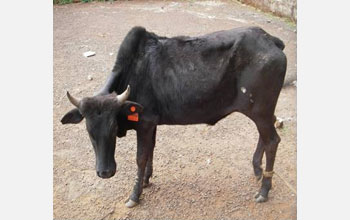News Release 12-024
NSF Provides Additional $5.9 Million to Support Five New BREAD Program Projects
Projects will use innovative approaches to advance basic research on key problems involving small farmer agriculture in the developing world

Potential vaccines will be developed against a costly livestock disease that is common in Africa.
February 9, 2012
This material is available primarily for archival purposes. Telephone numbers or other contact information may be out of date; please see current contact information at media contacts.
The National Science Foundation (NSF) has awarded five grants in the second year of the Basic Research to Enable Agricultural Development (BREAD) program.
Established in 2010, the five-year BREAD program is jointly funded with the Bill & Melinda Gates Foundation. Through the partnership between the Gates Foundation and the BREAD program, NSF supports international research projects at the proof-of-concept stage, with funding provided to both U.S. institutions and their international collaborators.
"The BREAD program continues to draw interest of scientists from around the world," said John Wingfield, NSF assistant director for Biological Sciences. "More than 160 U.S. institutions in 45 states, partnering with more than 260 institutions in 76 countries, submitted proposals in fields as diverse as the genetic improvement of crops and animals, control of diseases and pests, the chemistry and biology of soils and water, and engineering. The program and the awards made in 2011 epitomize how novel, transformative basic research in the biological sciences can contribute to major benefits to human society globally."
"The BREAD partnership is supporting research projects with real promise to help small farming families in developing countries boost their sustainable agricultural productivity," said Rob Horsch, deputy director of Global Development, Science and Technology at the Bill & Melinda Gates Foundation.
The awards involve 28 institutions in 6 states and international investigators from Angola, Benin, China, Colombia, the Dominican Republic, Egypt, Ethiopia, France, Israel, Kenya, Malawi, Nigeria, Peru, South Africa, Tanzania, Uganda, Zambia and Zimbabwe.
Examples of new awards
- Scientists at the J. Craig Venter Institute (JCVI), the International Livestock Research Institute (ILRI), and the National Institute for Agronomical Research (INRA) will join forces to use new synthetic biology technologies to create strains of Mycoplasma mycoides subspecies mycoides that can be developed as live vaccine candidates for the prevention of contagious bovine pleuropneumonia, an economically very important livestock disease within Africa.
- The ability to produce doubled haploid plants containing only one set of parental chromosomes could revolutionize breeding in slow cycling crops. Scientists at the University of California, Davis, the International Center for Tropical Agriculture (CIAT) (Colombia) and the International Institute of Tropical Agriculture (IITA) (Uganda) will exploit a recently developed, novel centromere engineering strategy to develop double haploids in banana and cassava.
- Emerging and reemerging pathogens, including many viruses, continue to cause devastating losses of food production in Africa. Yet there is a widespread lack of basic information and understanding of the virus populations throughout Africa. A team of biologists and computational scientists at the Boyce Thompson Institute for Plant Research and the International Potato Center (CIP) (Peru) will use a systems approach and small RNA deep sequencing on geo-referenced sample surveys from throughout Africa to generate and link viral genome sequence information and their distribution patterns with disease symptoms, epidemic risk prediction, and proposed management strategies.
- Key to the success of any strategy to control insect vectors of plant and animal viruses is early and fast detection of vector species and avoidance of infection. A research team at Cornell University/USDA-ARS, University of Washington, International Institute of Tropical Agriculture (IITA) (Nigeria) with collaborators at the USDA-ARS (Charleston, SC) and IITA (Cameroon) has identified a set of protein biomarkers that can identify vector competent populations of aphids, the most important vectors of plant viruses. They will exploit this discovery and determine whether biomarkers can identify vector competent populations of other homopteran insect vectors of plant viruses affecting staple food crops in sub-Saharan Africa.
- Cassava mosaic disease is caused by a DNA virus complex that includes seven geminivirus species. Two satellite DNAs are associated with the complex and can break resistance and enhance disease severity. The satellites do not resemble other geminivirus satellites and their mechanisms of action are not known. A project led by scientists at North Carolina State University, Mikocheni Agricultural Research Institute (MARI) (Tanzania), and the National Crops Resource Research Institute (NaCCRI-NARO) (Uganda) seeks to provide a deeper understanding of how these two small DNA molecules function in cassava, basic information that will be key to the development of strategies to overcome their detrimental effects on efforts to combat cassava viral diseases in Tanzania and other sub-Saharan African countries.
A complete list of 2011 BREAD awards can be accessed on the Directorate for Biological Sciences website.
-NSF-
Media Contacts
Lily Whiteman, National Science Foundation, (703) 292-8310, email: lwhitema@nsf.gov
The U.S. National Science Foundation propels the nation forward by advancing fundamental research in all fields of science and engineering. NSF supports research and people by providing facilities, instruments and funding to support their ingenuity and sustain the U.S. as a global leader in research and innovation. With a fiscal year 2023 budget of $9.5 billion, NSF funds reach all 50 states through grants to nearly 2,000 colleges, universities and institutions. Each year, NSF receives more than 40,000 competitive proposals and makes about 11,000 new awards. Those awards include support for cooperative research with industry, Arctic and Antarctic research and operations, and U.S. participation in international scientific efforts.
Connect with us online
NSF website: nsf.gov
NSF News: nsf.gov/news
For News Media: nsf.gov/news/newsroom
Statistics: nsf.gov/statistics/
Awards database: nsf.gov/awardsearch/
Follow us on social
Twitter: twitter.com/NSF
Facebook: facebook.com/US.NSF
Instagram: instagram.com/nsfgov


